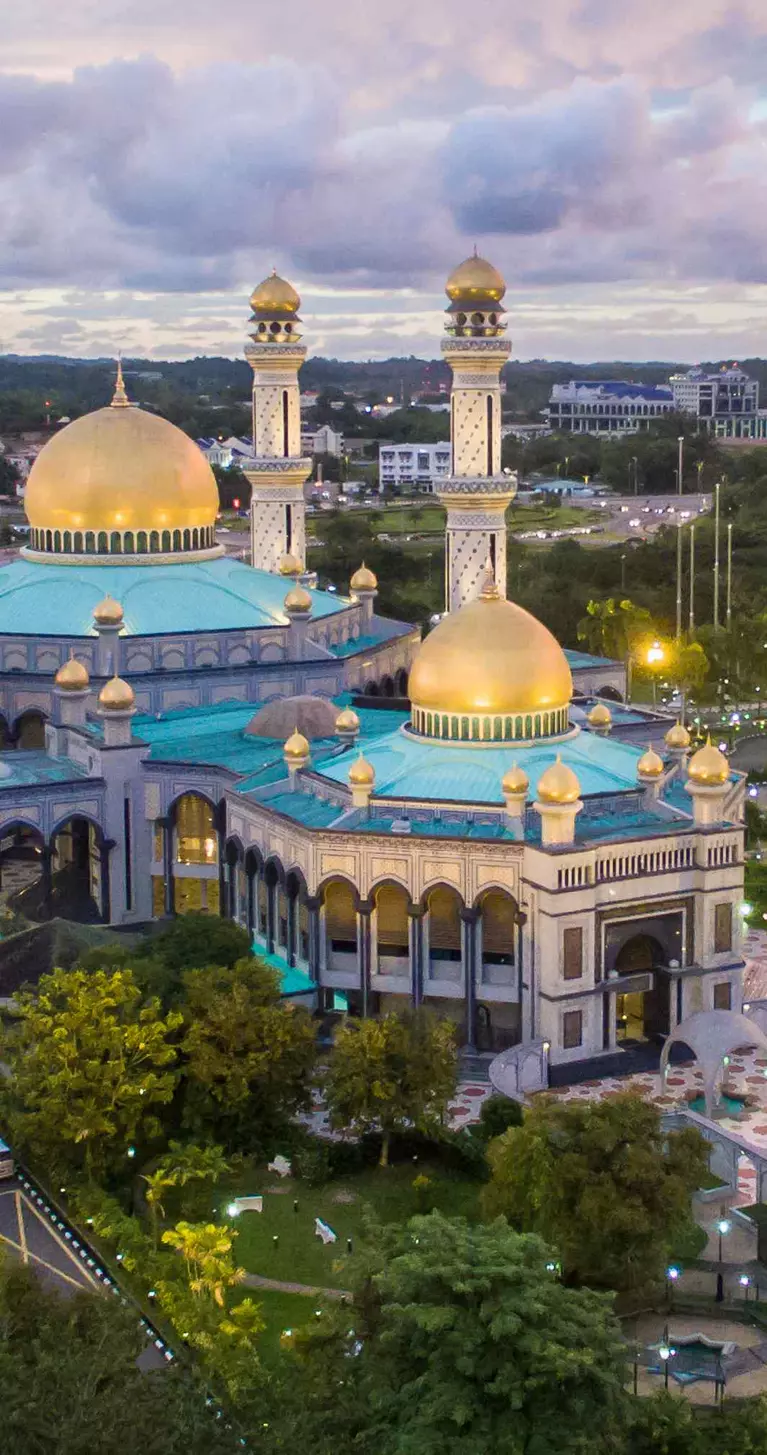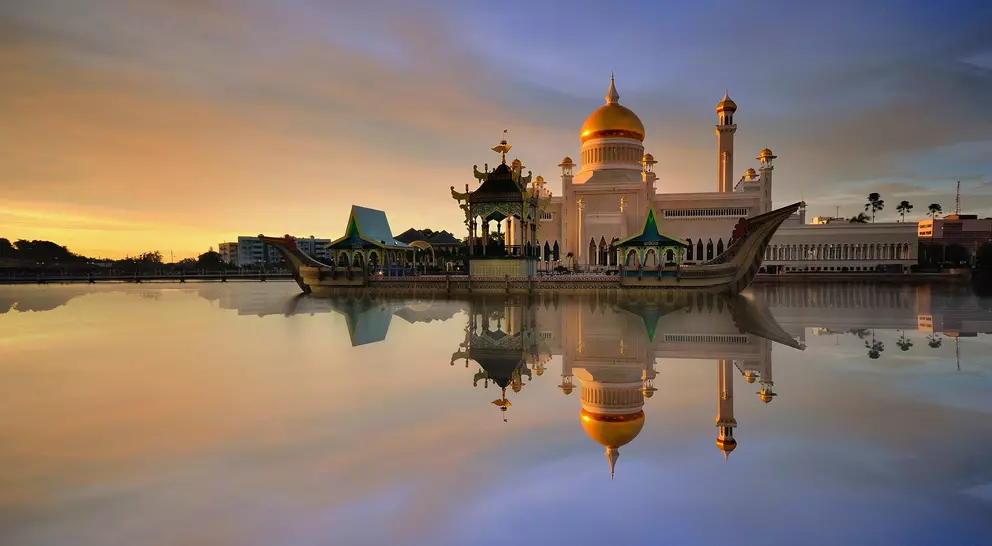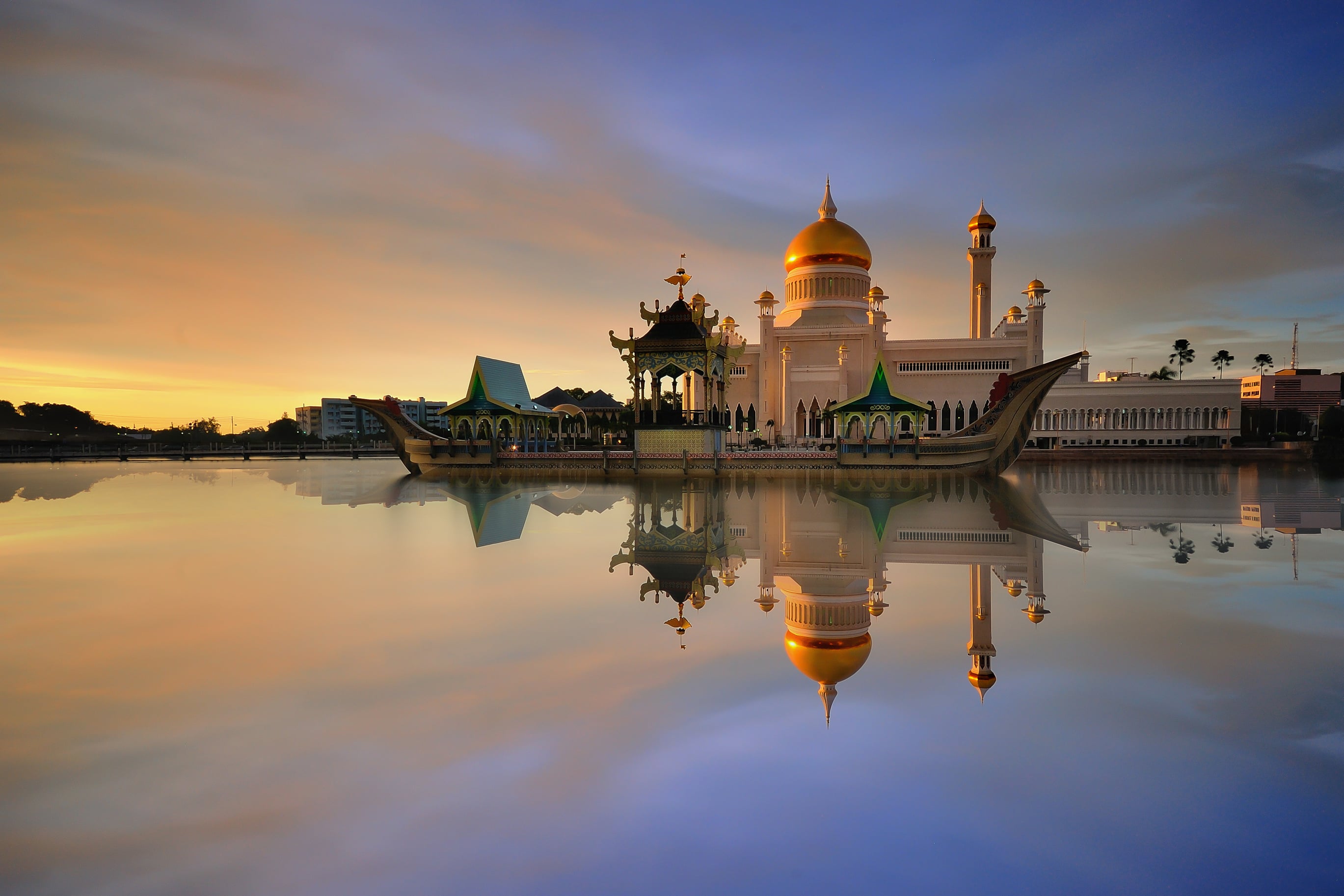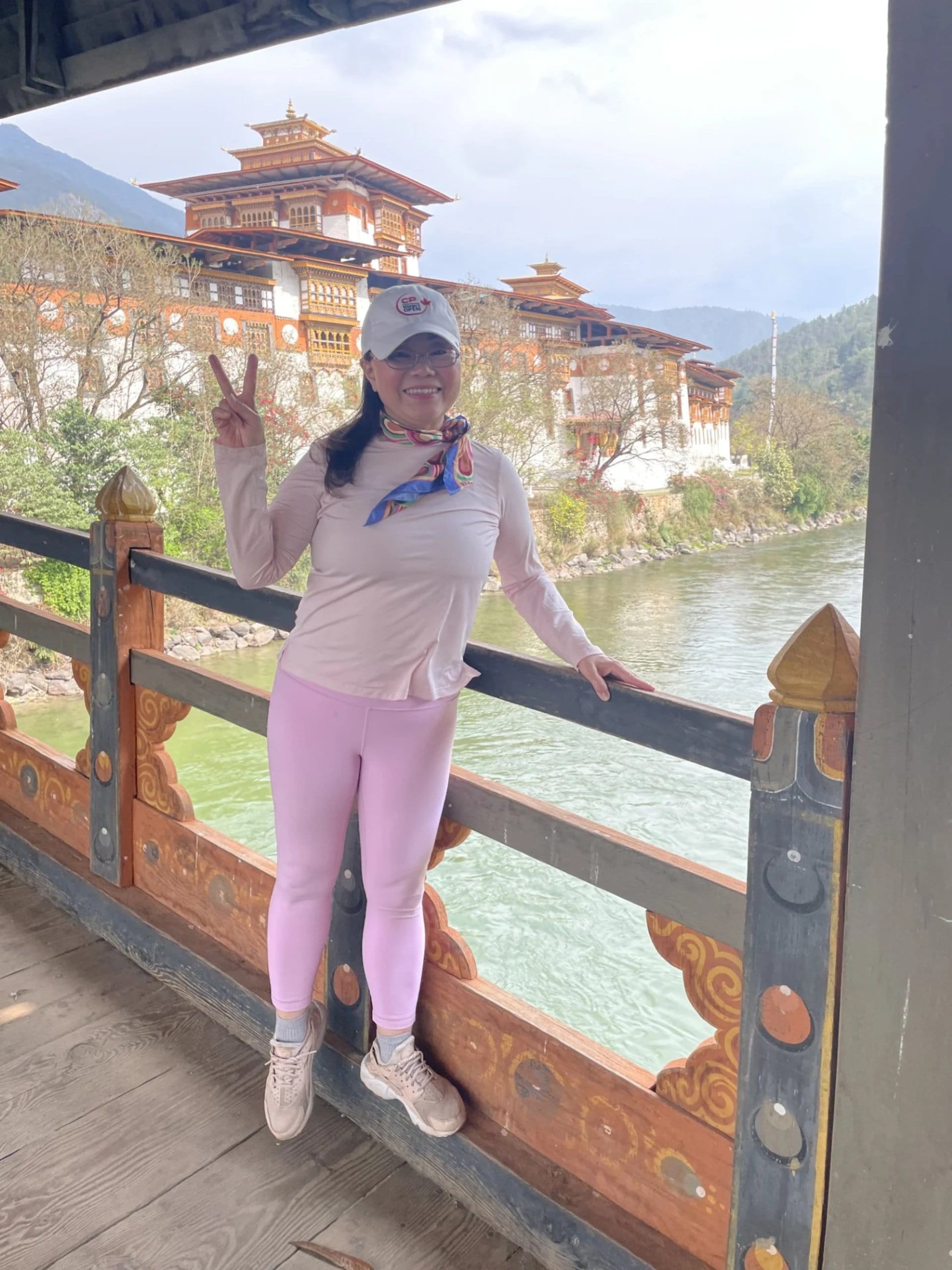US and Canadian citizens can visit visa-free for up to 90 days with a passport valid 6+ months. You must complete Brunei’s online E-Arrival Card before travelling (air, land, or sea). Canada also notes you may be asked to show proof of medical insurance covering your full stay. Requirements can change, so reconfirm closer to departure.
Discover Tailor-Made Brunei Darussalam Vacations
Rainforest adventures and cultural treasures in Brunei Darussalam.
Brunei Darussalam blends pristine rainforests, golden mosques, and rich heritage. Travellers can explore Ulu Temburong National Park, glide through water villages, and admire Islamic architecture, discovering a destination where nature and tradition live side by side.
Featured Highlights
- Explore pristine rainforest in Ulu Temburong National Park
- Marvel at Brunei’s grand golden-domed mosques
- Visit Kampong Ayer, the world’s largest water village
- Discover Borneo’s unique wildlife, from monkeys to hornbills
- Enjoy tranquil river journeys through lush landscapes
- Experience Brunei’s blend of tradition and modernity
Featured Brunei Darussalam Trip Ideas
Experience Brunei’s harmony of nature and culture.Brunei is a small yet captivating nation on the island of Borneo. Ulu Temburong National Park offers untouched rainforest, reached by river journey and canopy walk. In the capital, Bandar Seri Begawan, the Omar Ali Saifuddien Mosque and Jame’ Asr Hassanil Bolkiah Mosque display striking Islamic architecture. The Kampong Ayer water village invites exploration by boat, offering a glimpse of life on stilts above the Brunei River. Beyond its cultural sites, Brunei provides a peaceful gateway to Borneo’s biodiversity, where proboscis monkeys, hornbills, and rare orchids flourish. This balance of natural beauty and cultural depth makes Brunei an inspiring destination.
Brunei Escape
Bandar Seri BegawanDon't see the
perfect trip idea?
Request a custom quote.
Turn your travel dreams into reality with Goway. Our customized vacations take travellers to all corners of the world.
What do Goway's travellers say?

Get to know Brunei Darussalam before you go.
Best Time to Visit
Brunei’s tropical climate shapes the rhythm of life here, where heat, humidity, and sudden downpours are part of the daily experience. With little variation in temperature, the country welcomes travellers year-round, offering both cultural celebrations and leisurely explorations amidst its lush surroundings.
From March to late October, Brunei experiences warmer conditions, with March typically the hottest month. The season from late October through January is slightly cooler but also wetter, with October often bringing the heaviest rains. While the weather may not lend itself to a single “perfect” time to visit, it does provide shifting atmospheres—sometimes bright and steamy, other times cooled by refreshing showers.
Brunei’s cultural calendar adds another layer of vibrancy. National Day on 23 February and the Sultan’s birthday on 15 July bring the country to life with parades, fireworks, and traditional performances, making these especially memorable times to visit. These celebrations provide a window into Brunei’s heritage and the deep sense of pride among its people.
Getting around is simple and convenient. Many attractions lie within easy walking distance, typically no more than 20–25 minutes apart, making on-foot exploration rewarding if you don’t mind the heat. Car rentals offer flexibility for longer stays, while water taxis provide both a practical and scenic way to cross the river, often more efficient than road travel.
Brunei’s climate may be consistent, but the experiences it offers—whether cultural festivities, river journeys, or leisurely strolls—ensure every visit feels distinctive and engaging.
What do the experts say?
Aminah Arif Restaurant is a great local favourite where you can enjoy Brunei's national dish, ambuyat. It's their specialty!
A lesser-known spot I recommend visiting is the Kampong Ayer Stilt Villages. You'll find them just beyond the main tourist areas.
Places To Go
Handcrafted journeys to our most popular places to visit in Brunei Darussalam
Bandar Seri Begawan
Bandar Seri Begawan is the capital of Brunei and is its largest city. Originally known as Brunei...
Bandar Seri Begawan is the capital of Brunei and is its largest city. Originally known as Brunei Town, it was named after the Sultan’s late father, Omar Ali Saifuddien, in 1970.Located on the...
Travel Styles
Explore Brunei Darussalam by Travel Type
Ways to Travel

Ways to Travel
Frequently Asked Questions
Do I need a visa or special permits to enter Brunei Darussalam?
What language is spoken locally? How widely is English understood in Brunei Darussalam?
Malay (Bahasa Melayu) is the official language, while English is widely understood in business, government, and tourism. Brunei has long used a bilingual education policy, so most people—especially in cities—can converse in English.
What are the must-see attractions in Brunei Darussalam?
Start in Bandar Seri Begawan: the mirror-calm lagoon around Sultan Omar Ali Saifuddien Mosque at golden hour is unforgettable; step inside during visitor hours in modest dress. Drift by water taxi through Kampong Ayer, the stilted “water village,” then browse the Royal Regalia Museum. For nature, the canopy walkway at Ulu Temburong National Park puts you above emerald rainforest with river-mist at dawn. Since 2020, the stunning 26–30 km Temburong Bridge has made reaching the park faster by road. Goway features city tours and day trips that bundle these highlights.
Is Brunei Darussalam safe? What should I keep in mind while travelling there?
Brunei is generally very safe with low violent crime. Still, watch for petty theft and secure belongings. Laws are strict under civil and Sharia codes: drug penalties are severe; public displays of affection and certain behaviours (including some that aren’t crimes in North America) can be offences; LGBTQ2+ travellers should review guidance. Alcohol isn’t sold; non-Muslim adults may bring limited amounts for personal use if declared. Observe extra etiquette during Ramadan (avoid eating/drinking in public by day).
What’s the best way to travel within Brunei Darussalam?
Distances are short. In Bandar, public buses run but are infrequent; taxis cluster at hotels and the airport. Many visitors use the DART ride-hailing app or arrange a driver. Water taxis are the classic way to reach Kampong Ayer. The Temburong Bridge now links the capital to Ulu Temburong by road; tours can also combine boat and road for the rainforest. Goway can pre-arrange transfers and guided day trips.
What Brunei Darussalam cultural customs should I be aware of?
Dress modestly, especially in mosques and government sites (shoulders/knees covered; women may be asked to don a robe/headscarf provided at major mosques). Remove shoes before entering homes and prayer halls. Avoid loud behaviour, criticism of the royal family, and photographing people at prayer. Friday mid-day prayers can affect opening times. During Ramadan, eat and drink discreetly in private.
What should I wear/pack for Brunei Darussalam’s climate?
It’s tropical—hot, humid, and rainy year-round—with the heaviest showers roughly November to January and relatively drier months around February–March. Pack light, breathable layers; a compact rain jacket; sunhat; reef-safe sunscreen; and insect repellent. For mosque visits, bring modest clothing; a light scarf is handy. If you plan rainforest walks, add grippy footwear and a dry bag for sudden downpours.
Unlock more by subscribing to our newsletter.
With our newsletter, you’ll get access to regular communications that inspire you and help you explore the world your way.

